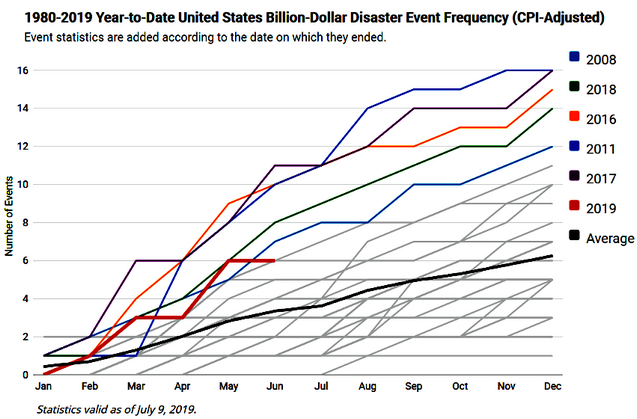“World food security increasingly at risk due to ‘unprecedented’ climate change impact, new UN report warns.” That’s the official United Nations website announcing a new report from the U.N. Intergovernmental Panel on Climate Change (IPCC).Our food is at risk? That gets our attention!
 |
Screen shot of UN webiste on food security report 8-2019
|
The report emphasizes that scaling solutions is critical to drive results – fast. But how?
Many communities are tackling this issue, but one here, one there is not fast enough to combat the current pace of climate change. A new center with powerful partners and resources has been formed to scale viable solutions at a record pace, that is, to reach one billion people on the planet with resilience solutions by 2030. That’s only 10 years.
“So, the urgency couldn’t be greater,” Kathy Baughman McLeod, the inaugural Director of the Atlantic Council’s new Adrienne Arsht-Rockefeller Foundation Resilience Center told me recently. To do so, they are laser focused on scaling solutions that have proven to be effective based on hard evidence. It’s also about campaigns to educate the public about what they can do in their own homes, schools and communities.
 |
Kathy Baughman McLeod, Atlantic Council Resilience Center, C40 Cities
photo Atlantic Council
|
This is not another opportunity for startups to pilot their programs, nor is it planning. And, no, they do not give grants. They work through partnerships and align with commitments cities and countries made in the Paris Climate Accord and with the Sustainable Development Goals.
McLeod said their key questions for whether or not they accept a project are, “Can we add value?... Are they asking for our help? Do we have something unique that others don’t? ... Where can we be effective and how can we get to a billion people in 10 years?”
Practical, Scalable, Community-Driven
McLeod emphasized that they have to be very practical and cost-effective, because, “We’re pure implementation.” Since they are focused on getting it done, being 100% convinced is not an option. If they are 80% sure it will work, it’s a “go.”
“We’re flying it and building it at the same time,” she explained. One strategy that are using to scale solutions is to test solutions across countries by leveraging “regional risks pools,” composed of several countries that are sharing the risks and reducing insurance costs.
The Center is helping cities and communities leverage the plans and strategies they have developed. “There’s a great pipeline,” McLeod said. “They know what needs to be done, the financial aspects and specific risks to that community. They know the stakeholders to engage.”
Some solutions are communications tools, for example, to help residents with the threat of global heat, which is lethal in some areas. She described an app the city of Athens developed called “Extrema,” which helps citizens find out where they can go to cool off and what they can do to protect their health, based on their location, age, and health status.
 |
NOAA graphic on frequency of billion-dollar climate disasters 1980-2019
NOAA
|
McLeod said they are “thinking about the psychology of resilience,” person by person, with families doing things differently, too. This is behavior modification, so they are also looking at how culture can help.
For example, video games that teach kids about climate change and being psychologically resilient (“such as a competition to beat the storm, beat the flood”), plays about it, and Batik art that inspires resilience.
Open Source
“Everything we do is going to be open source,” McLeod emphasized, because “one of the tenets of our work, is that we’re going to share how these projects are going early and often…as frequently as every 90 days,” because scaling fast is crucial.
This will create a huge collection of best practices for improving the resilience of communities and reducing the risks of climate change, including what has not worked for which communities and why, that anyone anywhere can access for free.
Links
- World food security increasingly at risk due to 'unprecedented' climate change impact, new UN report warns
- Adrienne Arsht-Rockefeller Foundation Resilience Center One billion resilient people by 2030
- Australia Can Address Climate Change By Changing Its Farming Practices And Dietary Habits
- The Climate Crisis Is Already Hitting Food Production: An Urgent System-Wide Response Is Needed
- The Scariest Thing About Climate Change: What Happens To Our Food Supply
- Climate Change Is Already Affecting Global Food Production—Unequally
- Extreme Weather Events Are Fueling ‘Food Shocks’ And Jeopardizing Global Security
- Australia’s Drought, Climate Change And The Future Of Food
- African Islands Call For Help As Climate Change Worsens Health
- Redrawing The Map: How The World’s Climate Zones Are Shifting

No comments :
Post a Comment